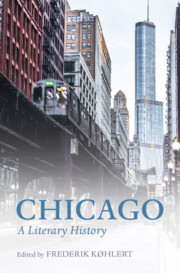Book contents
- Chicago: A Literary History
- Chicago
- Copyright page
- Contents
- Figures
- Contributors
- Acknowledgments
- Introduction: The Literary History of Chicago
- Part I The Rise of Chicago and the Literary West
- Part II Business Unusual: A New Urban American Literature
- Part III Radicalism, Modernism, and the Chicago Renaissance
- Part IV A City of Neighborhoods: The Great Depression, Sociology, and the Black Chicago Renaissance
- Chapter 17 Chicago Ecology and James T. Farrell’s Studs Lonigan
- Chapter 18 Chicago Gets the Blues: Migration, Depression, and the Black Renaissance
- Chapter 19 Black Chicago: Richard Wright’s South Side
- Chapter 20 Life in Bronzeville: Humanism and Community in the Work of Gwendolyn Brooks
- Chapter 21 Hustlers, Junkies, and Prostitutes: Nelson Algren’s White Slums
- Chapter 22 From Emptyland to Uncanny City: Saul Bellow’s Jewish Chicago
- Part V Traditions and Futures: Contemporary Chicago Literatures
- Selected Bibliography
- Index
Chapter 17 - Chicago Ecology and James T. Farrell’s Studs Lonigan
from Part IV - A City of Neighborhoods: The Great Depression, Sociology, and the Black Chicago Renaissance
Published online by Cambridge University Press: 02 September 2021
- Chicago: A Literary History
- Chicago
- Copyright page
- Contents
- Figures
- Contributors
- Acknowledgments
- Introduction: The Literary History of Chicago
- Part I The Rise of Chicago and the Literary West
- Part II Business Unusual: A New Urban American Literature
- Part III Radicalism, Modernism, and the Chicago Renaissance
- Part IV A City of Neighborhoods: The Great Depression, Sociology, and the Black Chicago Renaissance
- Chapter 17 Chicago Ecology and James T. Farrell’s Studs Lonigan
- Chapter 18 Chicago Gets the Blues: Migration, Depression, and the Black Renaissance
- Chapter 19 Black Chicago: Richard Wright’s South Side
- Chapter 20 Life in Bronzeville: Humanism and Community in the Work of Gwendolyn Brooks
- Chapter 21 Hustlers, Junkies, and Prostitutes: Nelson Algren’s White Slums
- Chapter 22 From Emptyland to Uncanny City: Saul Bellow’s Jewish Chicago
- Part V Traditions and Futures: Contemporary Chicago Literatures
- Selected Bibliography
- Index
Summary
When James T. Farrell’s Studs Lonigan trilogy is read today, it is typically read within limits. It serves as an example of proletarian, sociological, or naturalist fiction. In this view, it is emblematic of the post-Chicago Renaissance dark age of creativity, it demonstrates the influence of the University of Chicago’s sociology department’s focus on neighborhoods and juvenile delinquency, or it is an example of ethnic literature. With this chapter, I take the Chicago sociologists’s focus on “ecology” and broaden it to include human relationships with their non-human surroundings. Doing so demonstrates the wide potential of readings for Studs Lonigan, wherein the preceding circumscriptions give way to new forms of collaboration, contamination, and association more in line with ecological thinking of our own time. It is precisely Studs’s ability to take advantage of Chicago’s own ecological planning, with its large network of parks, that present these moments of what Donna Haraway calls “making kin.” It is up to us new readers, then, to understand why the potential remains unused.
- Type
- Chapter
- Information
- ChicagoA Literary History, pp. 239 - 252Publisher: Cambridge University PressPrint publication year: 2021

